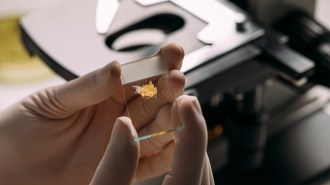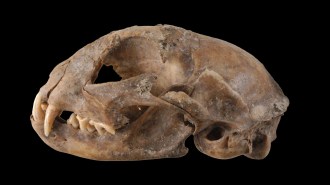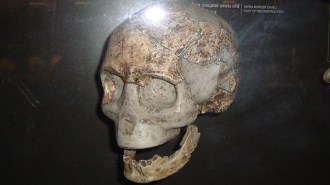Crime solvers embraced genetic genealogy
The Golden State killer case was just the beginning
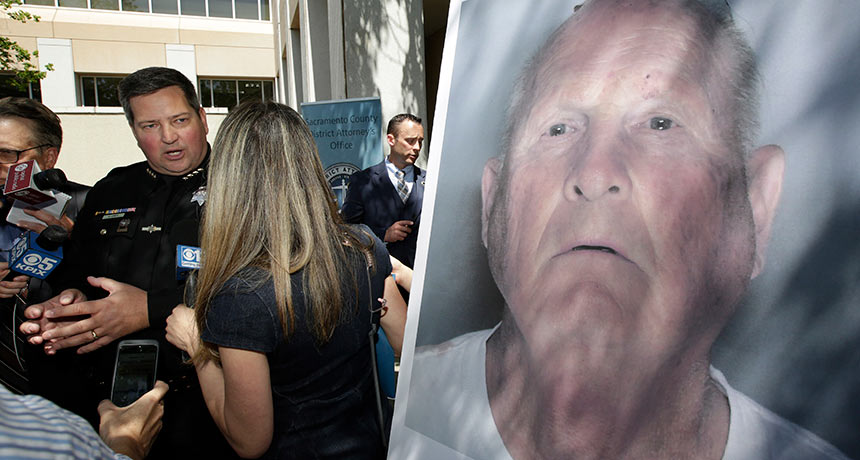
CAUGHT BY DNA Sacramento County Sheriff Scott Jones (left) discusses the April arrest of Joseph James DeAngelo (photo) in Sacramento, Calif.
Rich Pedroncelli/Associated Press
Every week, Ellen Greytak checks DNA profiles in a genealogy database. She’s not searching for long-lost relatives. She’s out to find family members of unknown assailants in rape and murder cases.
Greytak is director of bioinformatics at Parabon NanoLabs in Reston, Va. Since May, the company has used genetic genealogy, a forensic technique for tracking down suspects through their family trees, to help close more than a dozen cases nationwide.
In 2018, criminal investigators in the United States embraced the tool, solving decades-old cold cases and some fresh crimes. But this new type of DNA-based detective work has raised questions about genetic privacy and police procedures.
More than 12 million Americans have jumped on the consumer genetic testing bandwagon, sending spit samples to companies like 23andMe or AncestryDNA to learn about health risks and to explore family origins (SN: 6/23/18, p. 26). People who’ve had their DNA tested and want to find relatives tested by a different company can upload their results to a public database called GEDMatch.
Now GEDMatch is being used to locate rape and murder suspects. In April, Sacramento police arrested Joseph James DeAngelo as a suspect in the Golden State Killer case (SN Online: 4/29/18). DeAngelo, a former police officer, is accused of committing about 50 rapes and 12 murders from 1974 to 1986.
Police found DNA matches in GEDMatch to multiple third cousins of DeAngelo. Building out the suspect’s family tree eventually led investigators to DeAngelo. A few weeks after DeAngelo’s arrest, Parabon identified William Earl Talbott II as a suspect in a 1987 double murder of a young Canadian couple in Snohomish County, Wash. (SN: 6/23/18, p. 11). Since then, suspects in 16 other cases have been arrested after genetic genealogy searches.
Family ties
With DNA found at the crime scene in 1987, police probed a genealogy website called GEDmatch. Two people in the database shared some DNA with the supposed killer. Each person probably shared great-grandparents with the suspect. Reconstructing these people’s family trees led police to further investigate and arrest a suspect.
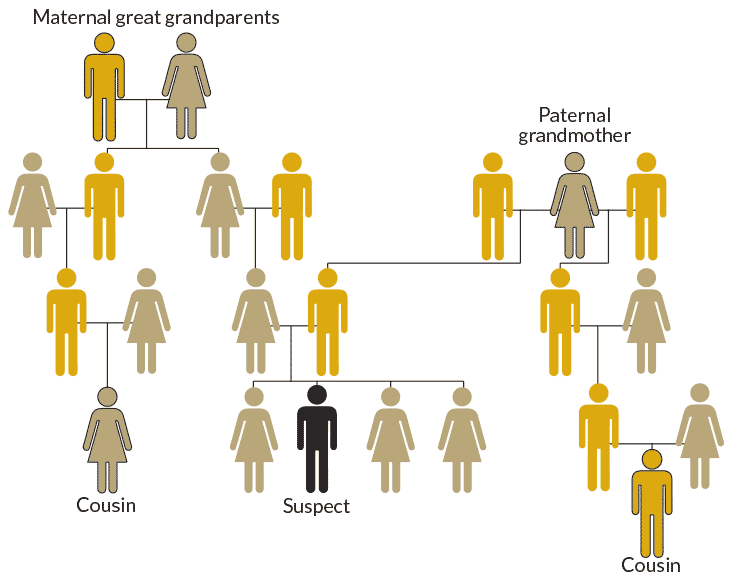
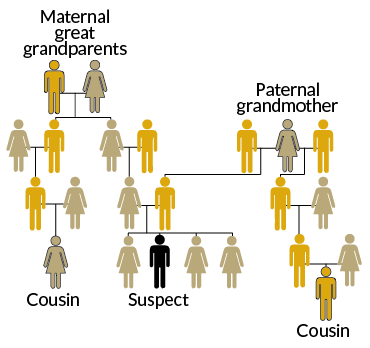
“Today, if you’re a criminal and you’ve left your DNA at the crime scene, you may as well turn yourself in now. We will catch you,” Mark Lindquist said at a June 22 news conference. The Pierce County, Wash., prosecutor was announcing the arrest of Gary Hartman for the 1986 killing of 12-year-old Michella Welch.
About 60 percent of Americans of mainly European heritage can be identified through their relatives’ DNA in genealogy databases (SN Online: 10/12/18). Soon GEDMatch may be big enough for U.S. investigators to figure out the source of almost any anonymous DNA sample. To reach that milestone, 3 million people would need to upload data to the site, scientists calculate. About 1.5 million to 2 million people have already done so.
Legal and privacy experts worry that this new sleuthing tool allows police to rummage in people’s genetic closets without probable cause (SN Online: 6/7/18). Police used to be limited to searching law enforcement databases, which include data from people arrested for or convicted of crimes, for direct matches to crime scene DNA. But the older type of DNA fingerprints used in those searches is good for finding only very close family members: a parent, child or sibling.
Genetic genealogy reaches further, analyzing DNA left at a crime scene (found in blood or semen, for example) for the same types of genetic markers that companies such as 23andMe and AncestryDNA use to determine customers’ ethnicity and help them find relatives. GEDMatch’s terms spell out that the database can be used to identify perpetrators of violent crimes (defined as homicide or sexual assault) or to identify remains of the deceased.
Police are unlikely to find a direct match in the database, says the site’s cofounder Curtis Rogers. “Serial killers tend not to put their DNA on GEDMatch,” he says. Instead, police may find hundreds to thousands of distant relatives who share some piece of DNA with the suspect. To narrow the search, genealogists typically need a match to a third cousin or closer relative on both sides of the family.
Innocent people looking for long-lost family may be surprised to find that putting their DNA on a public website opens them and their relatives to police scrutiny, says Andrea Roth, a professor of law at the University of California, Berkeley Law.
She and other critics charge that genetic genealogy searches put too many people under police scrutiny and should be regulated like law enforcement databases. For instance, California allows police to do family searches of law enforcement databases only as a last resort for the most serious crimes and limits what material can be used. Roth would go a step further: People whose DNA is collected as part of a genetic genealogy investigation and are not linked to the crime must have their data wiped from police databases.
But DNA relatives of a suspect aren’t being investigated; they are akin to eyewitnesses who might give police clues about who to look for, says Margaret Press, cofounder of the DNA Doe Project, which aims to identify human remains. The relatives offer a lead, similar to a shoe print or a fingerprint.
And follow-up investigations would include collecting new DNA samples to match against crime scene DNA. Even with a direct DNA match, police still need to build a case to show the person could have committed the crime, Greytak says. “We’re just helping them get there.”




